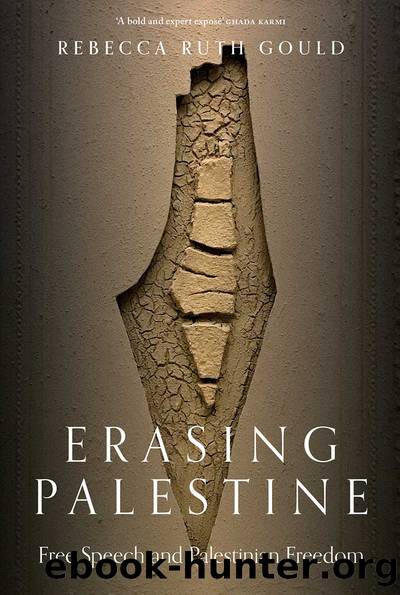Erasing Palestine by Rebecca Gould

Author:Rebecca Gould
Language: eng
Format: epub
Publisher: Verso Books
4
Free Speech and Palestinian Freedom
On 1 October 2021, the unthinkable happened. The University of Bristol announced that it had terminated the employment of David Miller. Miller was a professor of political sociology who specialized in exposing the networks of influence exerted on British and global politics by right-wing pressure groups. This was the first time a faculty member had ever been sacked in a British University specifically as a result of his public criticisms of Israel. The contentious process that led to the termination of Millerâs position is of interest to this inquiry into the future of free speech and the critique of antisemitism because of the deep divisions it created within the scholarly world, and the hypocrisies it exposed.
The firing of David Miller was unusual in that the statements that led to Millerâs termination were made outside a university venue and during a non-work-related online meeting. Another unprecedented detail of Millerâs case is that the university terminated his employment even before he had exercised his right to appeal the decision. The university was either already certain of what the outcome of the appeal would be, or was pressured by external parties to act quickly. Perhaps most paradoxically, the termination occurred after a Queenâs Counsel (QC) â a senior trial lawyer â hired by the university had determined that Millerâs comments âdid not constitute unlawful speechâ.1 Since Miller was fired by the very same university that had deliberated over calls to fire me in 2017, it is worth asking what specifically it is about the University of Bristol, with its overwhelmingly white and upper-class demographic, that attracts this kind of censorship.
Miller moved to the University of Bristol from a professorial position at the University of Bath in 2018, a year after my departure. I knew of his work, and recall being surprised that the university had been willing to hire such a controversial thinker, who was well known for his criticisms of Israel. All I had witnessed and experienced first-hand regarding the universityâs unwillingness to engage with Palestinian and other non-Eurocentric points of view led me to expect that Miller would have been greeted with a hostile reception. But when Millerâs appointment as professor was approved by the board, university administrators found nothing problematic in his statements or views. This only began to change once external groups began to complain. A similar pattern of administrative response can be detected in the case of Steven Salaita (see below), and indeed my own.
It did not take long after his move to Bristol before controversy began to surround Miller, particularly in connection with his lectures on the role of Zionism in British politics. In these lectures, Miller purported to identify a key networks of Zionist influence within the UK. Many of the organizations Miller named in his lectures â such as the Board of Deputies of British Jews, the Community Security Trust, the Britain Israel Communications and Research Centre (BICOM), and the Jewish Leadership Council â were outraged at being identified as agents of the Israeli state.
Download
This site does not store any files on its server. We only index and link to content provided by other sites. Please contact the content providers to delete copyright contents if any and email us, we'll remove relevant links or contents immediately.
| Arms Control | Diplomacy |
| Security | Trades & Tariffs |
| Treaties | African |
| Asian | Australian & Oceanian |
| Canadian | Caribbean & Latin American |
| European | Middle Eastern |
| Russian & Former Soviet Union |
The Secret History by Donna Tartt(16723)
The Social Justice Warrior Handbook by Lisa De Pasquale(11506)
Thirteen Reasons Why by Jay Asher(7833)
This Is How You Lose Her by Junot Diaz(5829)
Weapons of Math Destruction by Cathy O'Neil(5080)
Zero to One by Peter Thiel(4867)
The Myth of the Strong Leader by Archie Brown(4809)
Promise Me, Dad by Joe Biden(4478)
Beartown by Fredrik Backman(4465)
How Democracies Die by Steven Levitsky & Daniel Ziblatt(4448)
Stone's Rules by Roger Stone(4438)
The Fire Next Time by James Baldwin(4373)
100 Deadly Skills by Clint Emerson(4108)
A Higher Loyalty: Truth, Lies, and Leadership by James Comey(4059)
Rise and Kill First by Ronen Bergman(4045)
The David Icke Guide to the Global Conspiracy (and how to end it) by David Icke(3913)
The Farm by Tom Rob Smith(3895)
Secrecy World by Jake Bernstein(3808)
The Doomsday Machine by Daniel Ellsberg(3758)
